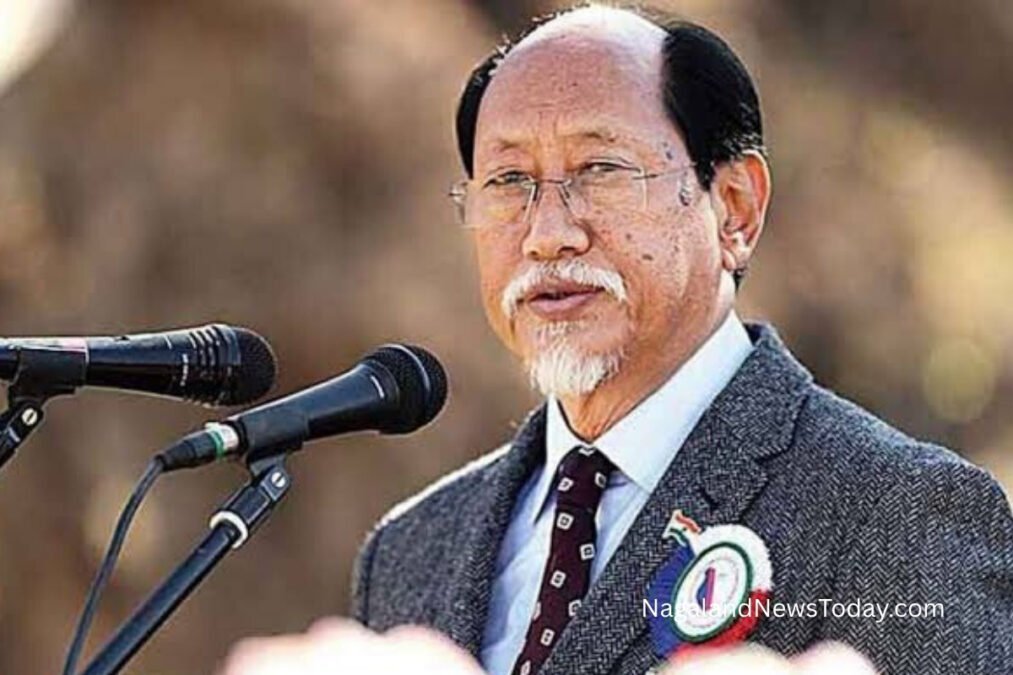Published by Aloto Naga | July 21, 2025
🔴 Updated on: 21 July 2025
Neiphiu Rio is the longest-serving Chief Minister of Nagaland, holding office for five terms across two decades. A native of Tuophema village and a member of the Angami Naga tribe, he began his journey in community service leading youth organizations and promoting sports as Chairman of the Nagaland Sports Council and Vice President of the Indian Olympic Association. Rio formally entered politics in 1989. He survived a political assassination attempt in 1995, served as a Member of Parliament (Lok Sabha) from 2014 to 2018, and played a key role in the Naga peace process, particularly the 2015 Framework Agreement.
Introduction
Neiphiu Guolhoulie Rio is a towering figure in Nagaland’s political history and one of the most influential leaders in Northeast India. As the longest-serving Chief Minister of Nagaland and the only person to hold the position for five terms, Rio has shaped the political landscape of the state for over two decades. His journey—from a village youth leader to a nationally recognized politician—stands as a testament to his resilience, adaptability, and commitment to peace, cultural identity, and development.
Early Life and Family Background
Born on November 11, 1950, in Tuophema village in Kohima district, Nagaland, Neiphiu Rio hails from the Angami Naga tribe, known for its cultural richness and strong community institutions. His father, Late Guolhoulie Rio, and mother, Kevilhouü Rio, were deeply respected figures in their community, instilling in their children strong values of integrity, discipline, and service.
His brother Zhaleo Rio is also an established political figure in the state and has served as Deputy Speaker of the Nagaland Legislative Assembly, further extending the family’s legacy in public service.
Rio is married to Kaisa Rio, a passionate agriculturist and floriculturist. They have six children—one son and five daughters. Despite holding the highest office in the state, Rio remains deeply connected to his cultural roots and village life.
Education and Formative Years
Rio’s educational journey began at Baptist English School in Kohima, and continued at Sainik School, Purulia in West Bengal, where he developed a foundation in discipline and leadership. He then attended St. Joseph’s College, Darjeeling, before completing his Bachelor of Arts from Kohima Arts College, then affiliated with NEHU (North-Eastern Hill University).
From a young age, Rio was involved in debates, student unions, and community organizing. His academic and extra-curricular experiences laid the groundwork for a lifetime of leadership in public affairs.
Early Community Leadership and Service
Even before formally entering politics, Rio was a respected community leader. He served as President of the Northern Angami Youth Organization, where he championed issues of rural development, youth welfare, and sports promotion. He was also Chairman of the Nagaland Sports Council and served as Vice President of the Indian Olympic Association, demonstrating a lifelong commitment to sports and cultural development in the state.
Entry into Politics and Early Rise
Rio’s formal political career began in 1974 as the President of the UDF Youth Wing in Kohima district. In 1984, he became Chairman of the Northern Angami Area Council, consolidating his standing as a grassroots leader.
He contested his first state assembly election in 1987 as an Independent candidate but was unsuccessful. In 1989, he was elected to the Nagaland Legislative Assembly from the Northern Angami-II constituency as a Congress (I) candidate. He has since become a political mainstay in the constituency, winning every election he has contested there.
Ministerial Roles and the Road to Chief Minister
Rio rose rapidly within the Congress government, holding multiple ministerial portfolios including:
- Sports & School Education
- Higher & Technical Education
- Art & Culture
- Works & Housing
- Home Minister
However, tensions with the then Chief Minister S. C. Jamir over the handling of peace talks led to Rio’s resignation in 2002. This bold move paved the way for him to form the Naga People’s Front (NPF) and lead a new political coalition.
Political Milestones and Challenges
Longest-Serving Chief Minister
In 2003, Neiphiu Rio became Chief Minister for the first time, ending Congress’s long-standing rule. He has since served five terms: 2003–2008, 2008–2013, 2013–2014, and 2018–present, making him the longest-serving CM in Nagaland’s history.
Assassination Attempt
In 1995, Rio survived a deadly assassination attempt in Dimapur when his motorcade was ambushed. His driver was killed, and several security personnel were injured, underscoring the volatility of Nagaland’s political environment at the time.
Party Transitions
Rio’s political journey is marked by strategic adaptability. After leaving the Congress, he co-founded the NPF. In 2017, he launched the Nationalist Democratic Progressive Party (NDPP) and led it to power in coalition with the Bharatiya Janata Party (BJP).
Financial Disclosure: Net Worth of Neiphiu Rio
Financial Disclosure: In his 2023 election affidavit, Neiphiu Rio declared total assets worth ₹46.95 crore, with ₹15.99 crore in movable assets and ₹30.96 crore in immovable assets, and liabilities of ₹8.69 lakh. This reflects a net increase of ₹10.54 crore since his 2018 declaration of ₹36.41 crore. The ADR ranked him as the fourth wealthiest Chief Minister in India in 2023.
Contributions to Peace and Development
Naga Peace Process
Rio has played a pivotal role in the Naga peace negotiations, particularly during the 2015 Framework Agreement signed between Naga groups and the Indian government. His focus has always been on dialogue, unity, and finding a peaceful solution to one of India’s longest-running insurgencies.
Cultural and Tourism Leadership
Under his leadership, the Hornbill Festival—Nagaland’s signature cultural event—was internationalized, attracting tourists from across the world and positioning Nagaland as a cultural tourism hotspot.
Innovation and Youth Empowerment
Programs like Startup Nagaland, the Nagaland Innovation Expo, and comprehensive skill development initiatives have been introduced to empower the state’s youth and foster entrepreneurship.
Tenure as Member of Parliament
From 2014 to 2018, Rio served as the Member of Parliament (Lok Sabha) from Nagaland. During this period, he was appointed to various parliamentary committees, using the opportunity to advocate for the interests of the Northeast region at the national level.
Policy Vision and Governance Style
Rio’s governance emphasizes coalition politics, inclusive development, and cultural identity. He introduced India’s first Music Task Force, promoting music as an industry, and consistently supported rural employment schemes, infrastructure development, and civil society partnerships.
He is known for his hands-on leadership and consensus-driven style, often involving tribal and church leaders in policy discussions.
Public Image and Personality
A skilled orator and accessible leader, Rio often emphasizes the themes of unity, permanent peace, and youth empowerment in his speeches. He maintains a strong digital presence and uses platforms like X (Twitter) to share policy updates and social messages.
He is also a devout Christian, with a personal interest in gardening, reading, music, and travel. His calm demeanor, strategic thinking, and ability to “read the people” are often cited as key traits by his peers.
National and International Recognition
- Mother Teresa Millennium Award for Political Leadership (2007)
- Honorary Doctor of Letters (Honoris Causa) from North East Christian University (2025)
- Honorary Deputy Governor, American Biographical Institute (1999)
Rio has also been regularly invited to national conferences and festivals as a representative of the Northeast and an advocate for tribal rights and sustainable development.
Lasting Legacy
Neiphiu Rio’s impact on Nagaland is profound. From negotiating peace to shaping modern governance structures, his contributions span politics, culture, education, and youth development.
As the state continues to evolve, his legacy is likely to be remembered not just for political longevity but for institution-building, conflict resolution, and a vision rooted in Naga identity and modern progress.


